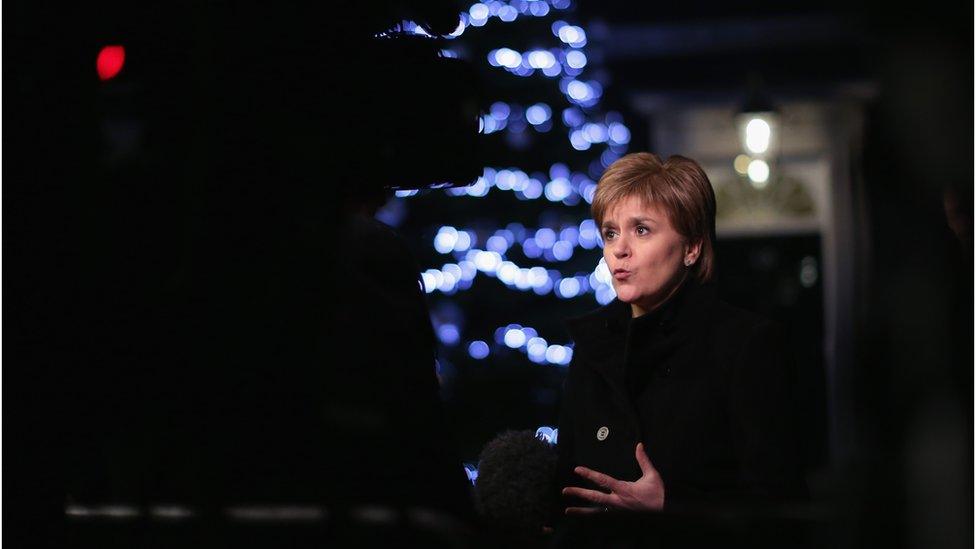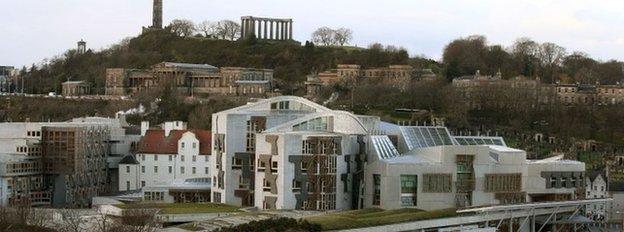Sturgeon expects devolution finance deal by February
- Published

A framework for devolution of more powers on tax and welfare to Scotland should be agreed by February, Nicola Sturgeon has said.
The first minister was speaking after holding talks with David Cameron at Downing Street.
She said she was not seeking "special treatment for Scotland", while the UK government promised a deal that "will stand the test of time".
The two leaders also agreed "ever-closer liaison" on security matters.
Mr Cameron agreed in September 2014 to hand substantial new powers to Scotland in the event of a No vote in last year's independence referendum.
After Scotland voted to remain in the UK, the Smith Commission was set up to decide the extent of the new powers and the future funding of Scotland, which has been based for decades on the Barnett formula. The Smith recommendations were embodied in the Scotland Bill, external, which is now being debated by the UK Parliament.

Analysis by Glenn Campbell, BBC Scotland political correspondent

Agreement on additional powers for the Scottish Parliament was supposed to have been finalised by now
New tax and welfare powers for Scotland were agreed by the Smith Commission after the "No" vote in the 2014 independence referendum.
The package has been translated into the Scotland Bill which is currently in the Lords and is due to become law before next year's Holyrood elections.
The UK and Scottish governments must first agree the financial arrangements that will underpin the new powers. The key issue is how to adjust the block grant Scotland receives from the Treasury each year to take into account the full devolution of income tax rates and bands.
As Scotland raises more of the cash it spends on services like the NHS, education and police - the amount it receives from the Treasury is reduced accordingly. It is relatively easy to work out what that figure should be in the first year but much harder to agree a method to calculate the adjustment for decades to come.
Other issues include the extent of Scotland's borrowing powers and how they interact with UK fiscal targets, funding set-up and administration costs especially for devolved welfare and independent scrutiny of Holyrood's new financial responsibilities.
Both sides say they want to reach a deal that is fair to both Scotland and the rest of the UK. Without such an agreement, SNP ministers have said they will block the Scotland Bill, by withholding Holyrood's consent for the legislation.
A deal was supposed to be reached by the end of the autumn. The talks are now expected to continue into the new year.
Read more about Scotland's devolution process:

Monday's meeting followed months of negotiations between Scotland's Deputy First Minister John Swinney and Chief Secretary to the Treasury Greg Hands.
In a statement released afterwards by Downing Street, Scotland Office Minister Lord Dunlop said: "If the powers contained in the Scotland Bill are used well by the Scottish Government, Scotland will do well.
"This is as it should be, and represents a good deal both for Scotland and for the rest of the UK."
Earlier Ms Sturgeon said it was vital that Scotland did not lose out and that the deal was fair.
She said: "The Smith Commission was clear that the Barnett formula must continue unaltered, and that the Scottish or UK governments should be no better or worse off simply as a result of the transfer of powers - before any policy decisions are taken.
"It is absolutely crucial that future Scottish governments can use the new tax and spending powers, to create a fairer society and grow the economy, without losing out.
"Today is not about agreeing a final deal but I hope we can make significant progress in agreeing that the deal must be a fair one."
The Scottish government will announce its annual Budget on Wednesday, with the SNP vowing to defend public services from spending cuts which it claims are being imposed from Westminster.
Union reforms
Measures to tackle so-called Islamic State were also discussed by Mr Cameron and Ms Sturgeon.
Mr Cameron appealed for SNP support for the Investigatory Power Bill, external, which would increase the authorities' surveillance powers.
It was agreed that the Joint Terrorism Analysis Centre in London would share more reports with the Scottish government, while Ms Sturgeon will receive more frequent security briefings, Downing Street said.
The first minister also criticised the government's Trade Union Bill, which she described as a "an assault on the trade union movement".
Mr Cameron was "happy to talk further to see if we could find any common ground", she said afterwards.
If it is passed, the Bill would introduce a threshold for strike ballots, new measures on picketing and would allow companies to hire agency staff to cover for striking staff.